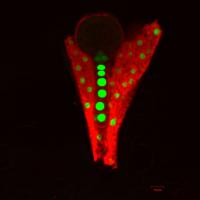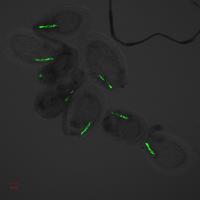
This is a confocal laser scanning microcope image of an early embryo with surrounding placental endosperm cells. A new generation of high yield plants could be created following a fundamental change in our understanding of how plants develop.
The research, led by the University of Warwick and published in the journal Science, provides the first evidence that plants have evolved ways to control embryo growth and development by emitting information from surrounding cells.
The international study, headed by Dr Jose Gutierrez-Marcos from Warwick's School of Life Sciences, revealed that female sex cells and the placenta-like endosperm contained within plant seeds send out specific signals to developing embryos to help direct their growth.
"This new information fundamentally changes our understanding of plant development and opens up exciting avenues of research, which could allow for the breeding and propagation of plants that incorporate the most successful characteristics of existing species", said Dr Gutierrez-Marcos.
"With rising global populations and changing climates, there is an increasing need for more robust plant varieties that provide higher yields and can grow under a wide set of environmental conditions. By understanding how plants control embryo growth we have opened up the possibility of breeding a new generation of plants that potentially meet these requirements." 
This is an image of early developing seeds carrying a green fluorescent reporter that mark the extra-embryonic suspensor cells.
Plant embryos are found within seeds and, once germinated, give rise to the adult plant. It was previously thought that embryo development was determined by the genetic make-up of the embryo alone.
The new research has however shown that specific cell-types present in the embryo environment can send out protein signals to also influence this process.
This situation mirrors a similar scenario in mammals, whereby embryo development is regulated by signals sent out by neighbouring placental cells.
Understanding how these cells of non-embryonic origin can influence developing plant embryos, the researchers argue, is key to creating new, improved plant species including advantageous hybrid crops, where at present embryos often fail to develop properly when distantly-related parents are used.
"Before our discovery, the ability of non-embryonic plant cells to direct embryo growth was unrecognised, but we now have valuable information that neighbouring cells can directly interact with and influence embryos, most likely via a cascade of protein signals. The next step is to identify the embryonic factors that respond to these non-embryonic signals and understand their mode of action" commented Dr Gutierrez-Marcos.
Source : a.t.frew@warwick.ac.uk
 Print Article
Print Article Mail to a Friend
Mail to a Friend
